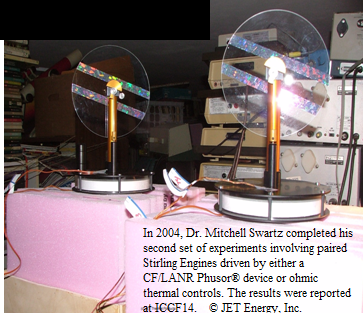|
In the field of cold fusion, having a laboratory rat ["lab rat"] upon which to try a few ideas, tweaks, changes, and the like, has been shown to be a good thing, in both aqueous and dry systems.
In aqueous CF/LANR systems, the lab rat is the Phusor®-type cathode in a high impedance CF/LANR systems [shown in open demonstration for several days at MIT in 2003 (ICCF-10) leading to many papers and discoveries.
Semiquantitative excess power exceeded 25 watts.
Stirling Engines in Cold Fusion/LANR have Demonstrated Excess Energy

In 2004, Dr. Mitchell Swartz (JET Energy) completed the second of two sets of experiments involving paired Stirling engines driven by either CF/LANR Phusor® devices or an ohmic thermal controls.
The results of both sets of runs had an average excess power gain ~170% and time integration and controls were used.
The results (and others supporting this) were reported at the DTRA meeting in Dec. 2006 [after which the following day DTRA voted to open US government to proposals involving cold fusion (lattice assisted nuclear reactions)], and at ICCF14 in 2007, and have been used to teach more details of the energy production and energy conversion science at the MIT IAP Courses on cold fusion.
|
Swartz M. R., Impact of an Applied Magnetic Field on a High Impedance Dual Anode LANR Device, J. Condensed Matter Nucl. Sci. 4, (2011), p 93; 239th American Chemical Society National Meeting and Exposition in San Francisco (2011).www.iscmns.org/CMNS/JCMNS-Vol4.pdf
Swartz M., Verner G., et al., Non-Thermal Near-IR Emission from High Impedance and Codeposition LANR Devices, Proc. ICCF14 1, (2008), p 343; Ed D.J. Nagel and M.E.Melich, ISBN: 978-0-578-06694-3, 343, (2010); www.iscmns.org/iccf14/ProcICCF14a.pdf
Swartz M., Verner G., The Phusor®-type LANR Cathode is a Metamaterial Creating Deuteron Flux for Excess Power Gain, Proc. ICCF14 2, (2008), p 458; Ed D.J. Nagel and M.E.Melich, ISBN: 978-0-578-06694-3, 458, (2010); www.iscmns.org/iccf14/ProcICCF14b.pdf
Swartz M., Excess Power Gain using High Impedance and Codepositional LANR DevicesMonitored by Calorimetry, Heat Flow, and Paired Stirling Engines, Proc. ICCF14 1, (2008), p 123; Ed D.J. Nagel and M.E.Melich, ISBN: 978-0-578-06694-3, 123, (2010); www.iscmns.org/iccf14/ProcICCF14a.pdf
Swartz, M., Bass, R.W., "Empirical System Identification (ESID) and Optimal Control of Lattice-AssistedNuclear Reactors," Proceedings of the 14th International Conference on Condensed Matter Nuclear Science and the 14th International Conference on Cold Fusion (ICCF-14), Ed D.J. Nagel and M.E.Melich, ISBN: 978-0-578-06694-3, 497, (2010).
Swartz, M., "Electrical Breakeven from LANR Phusor Device Systems: Relative Limitations of Thermal Loss in Feedback Loop", Proceedings of the 14th International Conference onCondensed Matter Nuclear Science and the 14th International Conference on Cold Fusion (ICCF-14), Ed D.J. Nagel and M.E.Melich, ISBN: 978-0-578-06694-3, 689, (2010).
Swartz, M., "Metamaterial Shaped LANR-Cathodes Produce Deuteron Flux", Infinite Energy, vol 90, April (2010).
Swartz, M., "Survey of the Observed Excess Energy and Emissions In Lattice Assisted Nuclear Reactions", Journal of Scientific Exploration, 23, 4, 419-436 (2009).
Swartz, M.R., "Excess Heat and Electrical Characteristics of Type "B" Anode-Plate High Impedance Phusor-type LANR Devices", American Chemical Society, Salt Lake City, UT, Journal of Scientific Exploration, 23, 4, 491-495 (2009).
Swartz, M., G. Verner, "Excess Heat from Low Electrical Conductivity Heavy Water Spiral-Wound Pd/D2O/Pt and Pd/D2O-PdCl2/Pt Devices", Condensed Matter Nuclear Science, Proceedings of ICCF-10, eds. Peter L. Hagelstein, Scott, R. Chubb, World Scientific Publishing, NJ, ISBN 981-256-564-6, 29-44; 45-54 (2006).
Swartz, M., "Can a Pd/D2O/Pt Device be Made Portable to Demonstrate the Optimal Operating Point?", Condensed Matter Nuclear Science, Proceedings of ICCF-10, eds. Peter L. Hagelstein, Scott, R. Chubb, World Scientific Publishing, NJ, ISBN 981-256-564-6, 29-44; 45-54 (2006).
Swartz, M., "Photoinduced Excess Heat from Laser-Irradiated Electrically-Polarized Palladium Cathodes in D2O", Condensed Matter Nuclear Science, Proc. ICCF-10, eds. Peter L. Hagelstein, Scott Chubb, NJ, ISBN 981-256-564-6, 213-226 (2006).
Swartz, M., G. Verner, "Dual Ohmic Controls Improve Understanding of 'Heat after Death'", Transactions American Nuclear Society, vol. 93, ISSN:0003-018X, 891-892 (2005).
Swartz. M., "The Impact of Heavy Water (D2O) on Nickel-Light Water Cold Fusion Systems", Proceedings of the 9th International Conference on Cold Fusion (Condensed Matter Nuclear Science), Beijing, China, Xing Z. Li, pages 335-342. May (2002).
Swartz, M, "Improved Electrolytic Reactor PerformanceUsing p-Notch System Operation and Gold Anodes, Transactions of the American Nuclear Association, Nashville, Tenn. Meeting, (ISSN:0003-018X publisher LaGrange, Ill) 78, 84-85 (1998).
Swartz. M., "Consistency of the Biphasic Nature of Excess Enthalpy in Solid State Anomalous Phenomena with the Quasi-1-Dimensional Model of Isotope Loading into a Material", Fusion Technology, 31, 63-74 (1997).
|